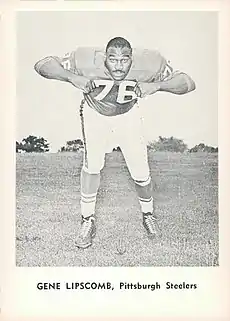Gene Lipscomb
Eugene Allen Lipscomb (August 9, 1931 – May 10, 1963) was an American professional football defensive tackle in the National Football League (NFL) for ten seasons and a professional wrestler. He was known by the nickname "Big Daddy".[1][2]
 Lipscomb c. 1961 | |||||
| No. 85, 78, 76 | |||||
|---|---|---|---|---|---|
| Position: | Defensive tackle | ||||
| Personal information | |||||
| Born: | August 9, 1931 Uniontown, Alabama, U.S. | ||||
| Died: | May 10, 1963 (aged 31) Baltimore, Maryland, U.S. | ||||
| Height: | 6 ft 6 in (1.98 m) | ||||
| Weight: | 306 lb (139 kg) | ||||
| Career information | |||||
| High school: | Miller (Detroit, Michigan) | ||||
| College: | None | ||||
| Undrafted: | 1953 | ||||
| Career history | |||||
| Career highlights and awards | |||||
| |||||
| Career NFL statistics | |||||
| |||||
| Player stats at NFL.com · PFR | |||||
Early life
Born in Uniontown, Alabama, Lipscomb never knew his father and moved to Detroit, Michigan at age three with his mother. When he was 11, his mother was murdered and he then lived with his maternal grandparents.
Professional career
After graduating from Miller High School, Lipscomb did not attend college and instead served in the United States Marine Corps, where he was stationed at Camp Pendleton and played on the camp's football team.
Lipscomb was signed as an undrafted free agent by the Los Angeles Rams in 1953. He was waived in September 1956 and claimed by the Baltimore Colts.[3] In 1958 and 1959, he was named to the Pro Bowl and was instrumental in the Colts' two consecutive NFL championships.
In July 1961, Lipscomb was traded to the Pittsburgh Steelers with center Buzz Nutter for receiver Jimmy Orr, defensive tackle Joe Lewis and linebacker Dick Campbell.[4][5][6] Lipscomb's final NFL game was the Pro Bowl in January 1963, in which he was voted lineman of the game.[7][8] During the 1959–60 and 1960–61 off-seasons, he was a professional wrestler.[9]
The Professional Football Researchers Association named Lipscomb to the PFRA Hall of Very Good Class of 2006.[10]
In 2019, Lipscomb was selected as a finalist for the NFL's 100th Anniversary Team.[11]
Death
On May 10, 1963, Lipscomb died of an overdose of heroin[1][12] in Baltimore, Maryland.[2][13][14] His funeral was held in Detroit and he was buried at Lincoln Park Memorial Cemetery.[15]
Further reading
- Davis, Kelcie "Gene Lipscomb 1931-1963", Blackpast Sports Bio, November 18, 2019
References
- "Grid star Lipscomb dies, narcotics use suspected". Pittsburgh Post-Gazette. Associated Press. May 11, 1963. p. 1.
- "Lipscomb dies under mysterious circumstances". Eugene Register-Guard. (Oregon). Associated Press. May 10, 1963. p. 2B.
- "Colts list biggest tan contingent; await Skins". Baltimore Afro-American. (Maryland). September 15, 1956. p. 22.
- "Lipscomb to join Steelers in 3-2 deal involving Orr". Pittsburgh Press. July 19, 1961. p. 38.
- Miller, Jimmy (July 20, 1961). "Steelers trade Orr, Lewis and Campbell". Pittsburgh Post-Gazette. p. 27.
- "Ewbank stresses youth movement for Colts". Reading Eagle. (Pennsylvania). Associated Press. July 20, 1961. p. 18.
- "East stars score 30-20 upset in Pro Bowl". Pittsburgh Post-Gazette. Associated Press. January 14, 1963. p. 22.
- "Jim Brown helps Sherman defeat Lombardi". Reading Eagle. (Pennsylvania). UPI. January 14, 1963. p. 14.
- https://www.wrestlingdata.com/index.php?befehl=bios&wrestler=13853.
{{cite web}}: Missing or empty|title=(help) - "Hall of Very Good Class of 2006". Archived from the original on January 18, 2017. Retrieved November 23, 2016.
- "Defensive lineman finalists revealed for NFL 100 All-Time Team". NFL.com.
- "Steeler star Lipscomb dies, dope hinted". Pittsburgh Press. May 10, 1963. p. 1.
- "Heroin caused Lipscomb death". Pittsburgh Press. UPI. May 15, 1963. p. 1.
- "New law may result in freedom". Baltimore Afro-American. (Maryland). July 27, 1963. p. 1.
- "Final respects paid Lipscomb". Pittsburgh Press. UPI. May 16, 1963. p. 46.
External links
- Michigan Sports Hall of Fame – Eugene Allen (Gene) Lipscomb
- Steeler Nation – Eugene “Big Daddy” Lipscomb
- Gene Lipscomb at Find a Grave